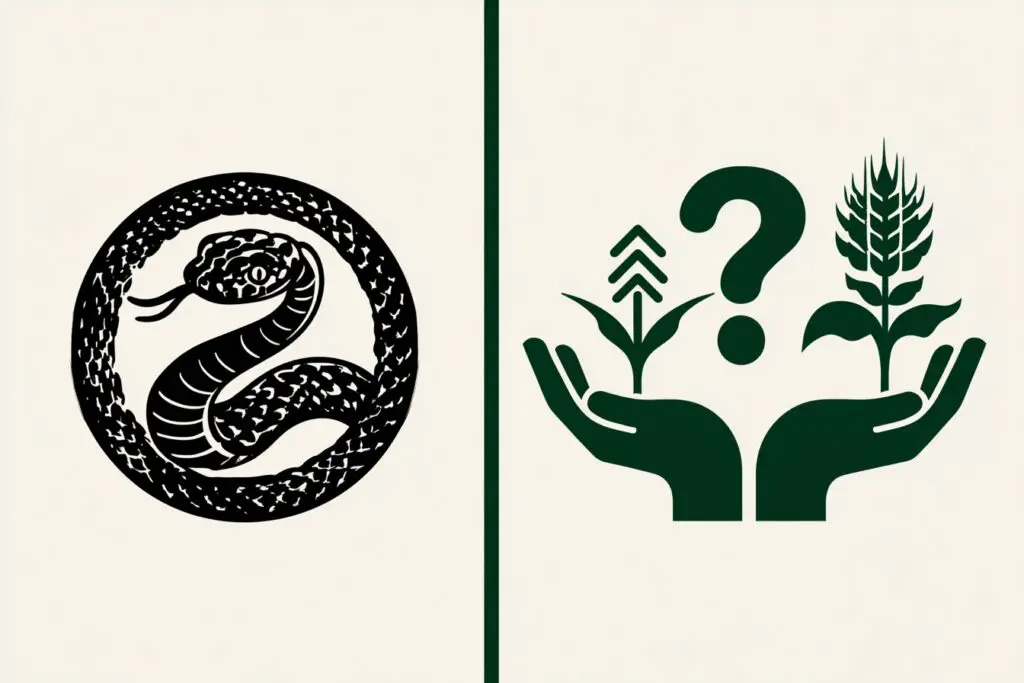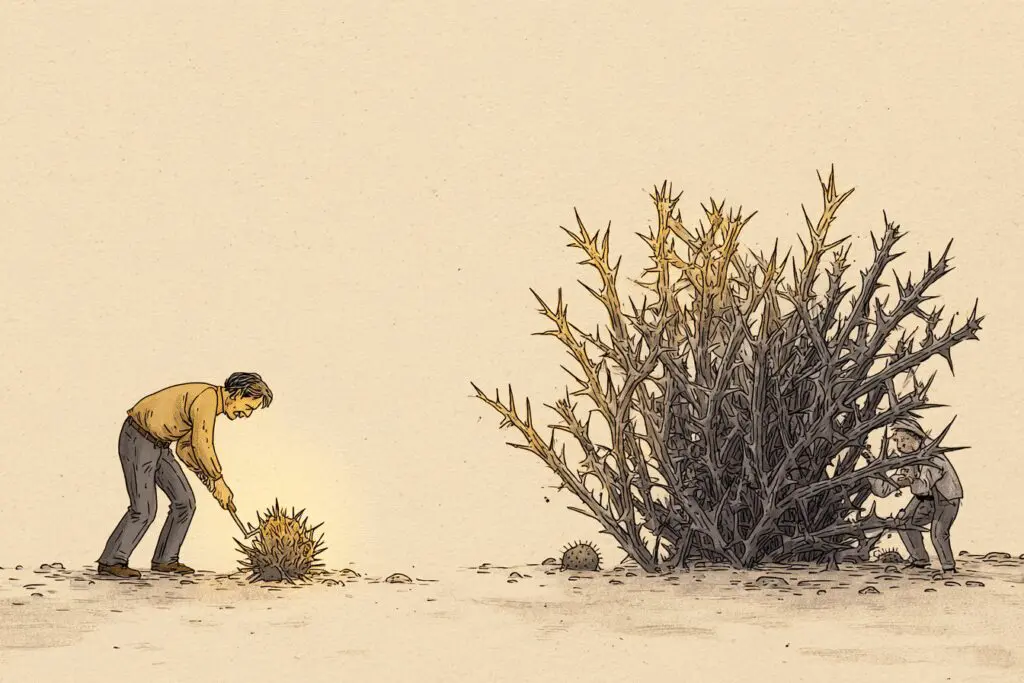Have you ever watched someone do something wrong and thought to yourself, “Well, they’ll get what’s coming to them”? Or maybe you’ve heard a friend say, “Karma’s going to get them,” after being treated unfairly. It’s a deeply ingrained idea in our culture—that the universe has a way of balancing the scales. This concept often gets boiled down to one word: karma. But as Christians who look to the Bible for truth, we have to ask ourselves a serious question: Is karma in the Bible?
The short answer is no. While the Bible has a powerful principle that looks similar on the surface—the law of sowing and reaping—it is fundamentally different from karma. The Bible’s teaching is not about an impersonal, cosmic force of justice. Instead, it’s about the direct, personal, and relational consequences of our choices before a holy and loving God. The most famous verse on this topic, Galatians 6:7, gives us the foundation: our actions have real, tangible results. But the context of that verse reveals a truth far more profound than karma could ever offer—a truth rooted in relationship, grace, and redemption.
More in Ethics & Morality Category
Can We Judge Others According to the Bible
What Goes Around Comes Around Bible
Key Takeaways
For those looking for a quick overview, here are the essential points to understand:
- The Bible Does Not Teach Karma. The concept of karma originates from Eastern religions like Hinduism and Buddhism and is tied to the idea of reincarnation, a belief not found in Scripture.
- The Bible Teaches Sowing and Reaping. Galatians 6:7 establishes that our actions (sowing) lead to consequences (reaping). This is a principle of cause and effect established by God.
- The Critical Difference is Grace. Karma offers no room for forgiveness. You must pay for every negative action. In contrast, Christianity is built on the grace of God through Jesus Christ, which forgives our sins and breaks the cycle of negative consequences we deserve.
- It’s About a Personal God, Not an Impersonal Law. Sowing and reaping operates under the watch of a personal God who is just, merciful, and actively involved in our lives. Karma is an automatic, impersonal universal law.
What Exactly is Karma? Unpacking the Eastern Concept
Before we can compare karma to biblical principles, we need to be clear about what karma actually is. It’s a word that gets thrown around a lot, often incorrectly. People might say they have “good karma” after finding a twenty-dollar bill, but that’s not really how the concept works in its original context.
Where Does the Idea of Karma Come From?
The concept of karma is a core tenet in several Eastern religions, primarily Hinduism and Buddhism. It’s an ancient idea, far older than its casual use in modern Western culture. In these worldviews, karma is the sum of an individual’s actions and their consequences in this and previous lives. It’s a law of moral cause and effect that is believed to govern the universe.
I remember my first real encounter with this idea was in a world religions class back in college. The professor explained that for billions of people, karma isn’t just a saying; it’s a fundamental spiritual law as real as gravity. It dictates not just your fortune in this life, but your station in the next one.
How Does Karma Supposedly Work?
At its heart, karma is an impersonal and automatic law. There’s no divine judge weighing your actions and handing out rewards or punishments. It just happens. Here’s a simple breakdown:
- Action and Reaction: Every action, thought, and word you put out into the universe creates a ripple effect. Good actions create positive effects, while bad actions create negative ones.
- The Cycle of Rebirth (Samsara): Karma is inextricably linked to reincarnation. The consequences of your actions might not show up in this lifetime. Instead, your karma determines the circumstances of your next life. If you live a virtuous life, you might be reborn into a better situation. If you live a life of negative actions, you could be reborn into a life of suffering.
- No Escape Through Forgiveness: This is a crucial point. In a karmic system, there is no grace. There is no forgiveness that can wipe the slate clean. The debt from negative actions must be paid, even if it takes many lifetimes to do so. The law is absolute.
What Does the Bible Say About Sowing and Reaping?
Now, let’s turn to the Bible. The Christian faith has its own profound understanding of cause and effect, and it’s most clearly articulated in the principle of sowing and reaping. It sounds similar to karma, but as we’ll see, it operates within a completely different framework.
The Foundational Scripture: Galatians 6:7-9 Explained
The Apostle Paul, writing to the churches in Galatia, laid out this principle with striking clarity. He wrote:
“Do not be deceived: God cannot be mocked. A man reaps what he sows. Whoever sows to please their flesh, from the flesh will reap destruction; whoever sows to please the Spirit, from the Spirit will reap eternal life. Let us not become weary in doing good, for at the proper time we will reap a harvest if we do not give up.” (Galatians 6:7-9, NIV)
Let’s break this down. Paul is making a simple agricultural analogy. A farmer who plants corn is not going to harvest beans. It’s a law of nature. What you put in the ground determines what you get out of it. Spiritually, the same logic applies.
Paul presents two options for where we can “sow” our lives:
- Sowing to the Flesh: This means living a life centered on our sinful, selfish desires. It’s a life focused on immediate gratification, pride, greed, and worldly pursuits. Paul is clear that the “harvest” of this lifestyle is “destruction.” This doesn’t just mean a bad life now; it points to eternal separation from God.
- Sowing to the Spirit: This means living a life guided by the Holy Spirit. It’s a life centered on loving God and loving others. This involves prayer, reading Scripture, serving, and cultivating the fruits of the Spirit like love, joy, and peace. The harvest here is “eternal life”—a rich, full relationship with God both now and forever.
Is Karma in the Bible Then? The Key Differences
So, is the principle of sowing and reaping just a biblical version of karma? Absolutely not. While both concepts link actions to consequences, they are built on opposing foundations. The differences between them are not just minor details; they are chasms that separate two entirely different views of God, humanity, and salvation.
Difference #1: The Source of Judgment – A Personal God vs. an Impersonal Law
This is perhaps the most significant distinction. Karma is an impersonal, unthinking law. It’s like a spiritual vending machine: you put in a bad deed, you get out a bad consequence. There is no one behind the machine.
The biblical principle of sowing and reaping, however, operates under the watchful eye of a personal God. Paul’s warning in Galatians 6:7 is “God cannot be mocked.” The consequences of our actions are not just random universal reactions; they are part of a system of justice and order created and overseen by a relational Being who cares deeply about our choices. He is a Father and a Judge, not a blind force.
Difference #2: The Role of Grace and Forgiveness
Here is where the Christian faith shines with a hope that karma can never offer. In a karmic system, you are trapped. Every wrong must be paid for. There is no mercy, no second chances—only an endless accounting of spiritual debt across countless lifetimes.
Christianity presents a radical alternative: grace.
The central message of the Gospel is that Jesus Christ paid the debt we could never pay. He took the consequences of our sinful “sowing” upon Himself on the cross. Because of this, forgiveness is possible. The Bible says in 1 John 1:9:
“If we confess our sins, he is faithful and just and will forgive us our sins and purify us from all unrighteousness.”
This is a game-changer. Through repentance and faith in Jesus, the cycle of reaping destruction for our sin is broken. We are forgiven. Our slate is wiped clean, not because we earned it, but because God is merciful. Karma has no concept of this kind of undeserved, transformative mercy.
Difference #3: The Final Outcome – Reincarnation vs. Eternal Destiny
Karma works within a worldview of reincarnation—a continuous cycle of life, death, and rebirth. The goal is to eventually accumulate enough good karma to escape this cycle and achieve a state of enlightenment or unity with the universe.
The Bible teaches something very different. It states clearly in Hebrews 9:27 that “people are destined to die once, and after that to face judgment.” We have one life to live, one life to make choices, and one life to accept or reject God’s offer of salvation. Our destiny is not to be reborn, but to spend eternity in one of two places: with God in heaven or separated from Him in hell. The stakes are much higher, and the solution is not self-improvement over lifetimes, but faith in Christ in this lifetime.
Why Can’t We Just Use “Karma” as a Christian Nickname for Sowing and Reaping?
I’ve had friends ask this before. If the ideas are kind of similar, what’s the harm in using the word “karma”? The problem is that words carry entire worldviews with them. When we use the word “karma,” we are unintentionally importing ideas that are fundamentally opposed to the Christian faith, such as reincarnation and the absence of grace.
Using the correct biblical term—sowing and reaping—keeps our focus where it belongs: on our relationship with God, the reality of our choices, and the incredible, life-changing power of the forgiveness offered through Jesus Christ.
Are There Other Bible Verses That Sound Like Karma?
Some people might point to other passages in the Bible as evidence for a karma-like system. It’s a fair question, as several verses in the Old and New Testaments discuss the principle of getting back what you put out. However, a closer look shows that they all operate within the biblical framework of a personal God, not an impersonal law.
The Principle of Reciprocity in Proverbs
The book of Proverbs is filled with wisdom about how life generally works. You’ll find verses like:
“Whoever digs a pit will fall into it; if someone rolls a stone, it will roll back on them.” (Proverbs 26:27)
This sounds a lot like “what goes around, comes around.” But Proverbs is a book of wisdom literature, not absolute law. It describes observable patterns in human behavior and their likely outcomes. It shows that there are natural consequences to foolish and wicked actions. However, these are general principles, not an unbreakable karmic chain. God can and often does intervene with mercy or judgment in ways that defy these general patterns.
The Story of David and Bathsheba: A Case Study in Consequences
The life of King David provides one of the most powerful illustrations of sowing and reaping within a framework of grace.
- Sowing to the Flesh: David committed adultery with Bathsheba and then had her husband, Uriah, murdered to cover it up. These were horrific sins—the very definition of sowing to the flesh.
- Reaping the Consequences: David did not escape the consequences of his actions. God sent the prophet Nathan to confront him, and David’s life was marked by tragedy afterward. The child born from his affair died, and his family was torn apart by violence and rebellion. He reaped a bitter harvest.
But here is the critical part that separates this from karma:
- Receiving Grace: When confronted, David repented deeply (see Psalm 51). And God forgave him. David’s eternal relationship with God was restored. He did not have to be reborn as a lesser being to pay off his karmic debt. He faced painful earthly consequences for his actions, but God’s grace covered his ultimate sin. This story beautifully shows that our actions have real consequences, but forgiveness through repentance is always available.
How Should Christians Live in Light of Sowing and Reaping?
Understanding this biblical principle shouldn’t be a source of fear, but of motivation. It’s not about nervously trying to balance our good and bad deeds. It’s about recognizing that our daily choices matter deeply because they are seeds that will one day produce a harvest. It empowers us to live intentionally for God.
Sowing to the Spirit: What Does That Actually Look Like?
Living a life that sows to the Spirit isn’t about a checklist of religious duties. It’s about cultivating a relationship with God and allowing His Spirit to work in and through you. I’ve found it helpful to think of it in practical terms. Sowing to the Spirit involves:
- Spending time in God’s Word: Letting the Bible shape your thoughts and heart.
- Consistent Prayer: Talking with God, listening to Him, and aligning your will with His.
- Active Fellowship: Engaging with a community of believers for encouragement, accountability, and worship.
- Serving Others: Looking for opportunities to show God’s love in tangible ways.
- Making Choices that Honor God: In your finances, relationships, entertainment, and work.
The Promise of a Harvest: Don’t Lose Heart!
One of the most encouraging parts of the Galatians passage is verse 9: “Let us not become weary in doing good, for at the proper time we will reap a harvest if we do not give up.”
There have been seasons in my own life where it felt like I was sowing seeds on concrete. I was trying to do the right thing—in my family, at work, in my ministry—and seeing no positive results. It’s easy to get discouraged and think, “What’s the point?”
Paul’s encouragement is a lifeline in those moments. He reminds us that the harvest is guaranteed, but it comes “at the proper time”—God’s time, not ours. Our job is not to worry about the timing of the harvest. Our job is to keep faithfully sowing. If you feel weary today, hold on to that promise. The harvest is coming. For more on this, Liberty University offers a solid perspective on the practical application of this principle.
Conclusion: More Than Karma, It’s About Relationship
So, is karma in the Bible? The answer is a clear and resounding no.
The world’s idea of karma is a cold, impersonal system of cosmic justice. It offers no mercy, no grace, and no relationship. It leaves you on an endless treadmill, trying to work off a debt you can never fully pay.
The Bible’s principle of sowing and reaping is entirely different. It is personal, relational, and operates under the authority of a loving God. It confirms that our choices are significant and have real-world consequences, but it never leaves us without hope.
This truth frees us from fear. We don’t have to worry about an unknown spiritual debt from a past life or constantly try to rack up “good karma.” Instead, we can live in the freedom of grace, knowing we are forgiven. And out of gratitude for that grace, we can joyfully choose to sow to the Spirit, planting seeds of love, kindness, and faithfulness, eagerly awaiting the beautiful harvest that God has promised.
Frequently Asked Questions – Is Karma in the Bible

What should we understand about sowing to the flesh versus sowing to the Spirit?
Sowing to the flesh involves living for selfish desires and leads to ruin and separation from God. Sowing to the Spirit means living according to God’s guidance, led by the Holy Spirit, resulting in a fruitful life that brings us closer to God and leads to eternal life.
Can Christians experience the results of their actions, and what role does God’s grace play?
Yes, Christians can experience the results of their actions here on earth, both good and bad. God’s grace through Jesus offers forgiveness and spiritual renewal, enabling believers to start planting good seeds regardless of past mistakes. Grace does not cancel out earthly consequences but transforms our hearts and our future.
What is the significance of Galatians 6:7 in understanding cause and effect?
Galatians 6:7 reminds us that God is not mocked and that we reap what we sow. However, this principle in the Bible is rooted in God’s fairness and love. It is a call for responsible living, not a mechanic to earn or avoid reward, but a way to understand how our choices affect our relationship with God.
How does the Bible’s idea of reaping and sowing differ from karma?
The Bible’s idea of reaping and sowing is based on a personal relationship with a loving God who cares about us and guides us. Unlike karma, which is seen as a natural and impersonal law, biblical reaping and sowing emphasize God’s justice, grace, and the opportunity for forgiveness through Jesus.
Is the concept of karma found in the Bible?
No, the concept of karma is not found in the Bible. The Bible teaches that our actions have consequences based on God’s fair judgment, not a cosmic rule like karma that operates without personal intention or forgiveness.




